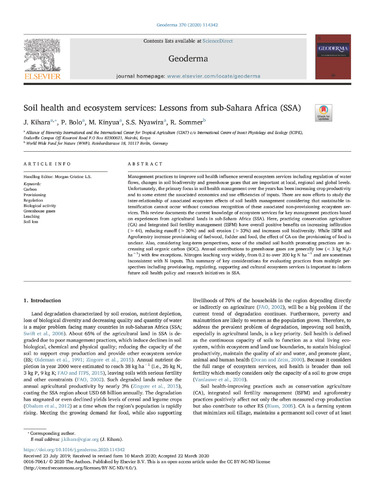Soil health and ecosystem services: Lessons from sub-Sahara Africa (SSA)
Management practices to improve soil health influence several ecosystem services including regulation of water
flows, changes in soil biodiversity and greenhouse gases that are important at local, regional and global levels.
Unfortunately, the primary focus in soil health management over the years has been increasing crop productivity
and to some extent the associated economics and use efficiencies of inputs. There are now efforts to study the
inter-relationship of associated ecosystem effects of soil health management considering that sustainable intensification
cannot occur without conscious recognition of these associated non-provisioning ecosystem services.
This review documents the current knowledge of ecosystem services for key management practices based
on experiences from agricultural lands in sub-Sahara Africa (SSA). Here, practicing conservation agriculture
(CA) and Integrated Soil fertility management (ISFM) have overall positive benefits on increasing infiltration
(> 44), reducing runoff (> 30%) and soil erosion (> 33%) and increases soil biodiversity. While ISFM and
Agroforestry increase provisioning of fuelwood, fodder and food, the effect of CA on the provisioning of food is
unclear. Also, considering long-term perspectives, none of the studied soil health promoting practices are increasing
soil organic carbon (SOC). Annual contributions to greenhouse gases are generally low (< 3 kg N2O
ha−1) with few exceptions. Nitrogen leaching vary widely, from 0.2 to over 200 kg N ha−1 and are sometimes
inconsistent with N inputs. This summary of key considerations for evaluating practices from multiple perspectives
including provisioning, regulating, supporting and cultural ecosystem services is important to inform
future soil health policy and research initiatives in SSA.

